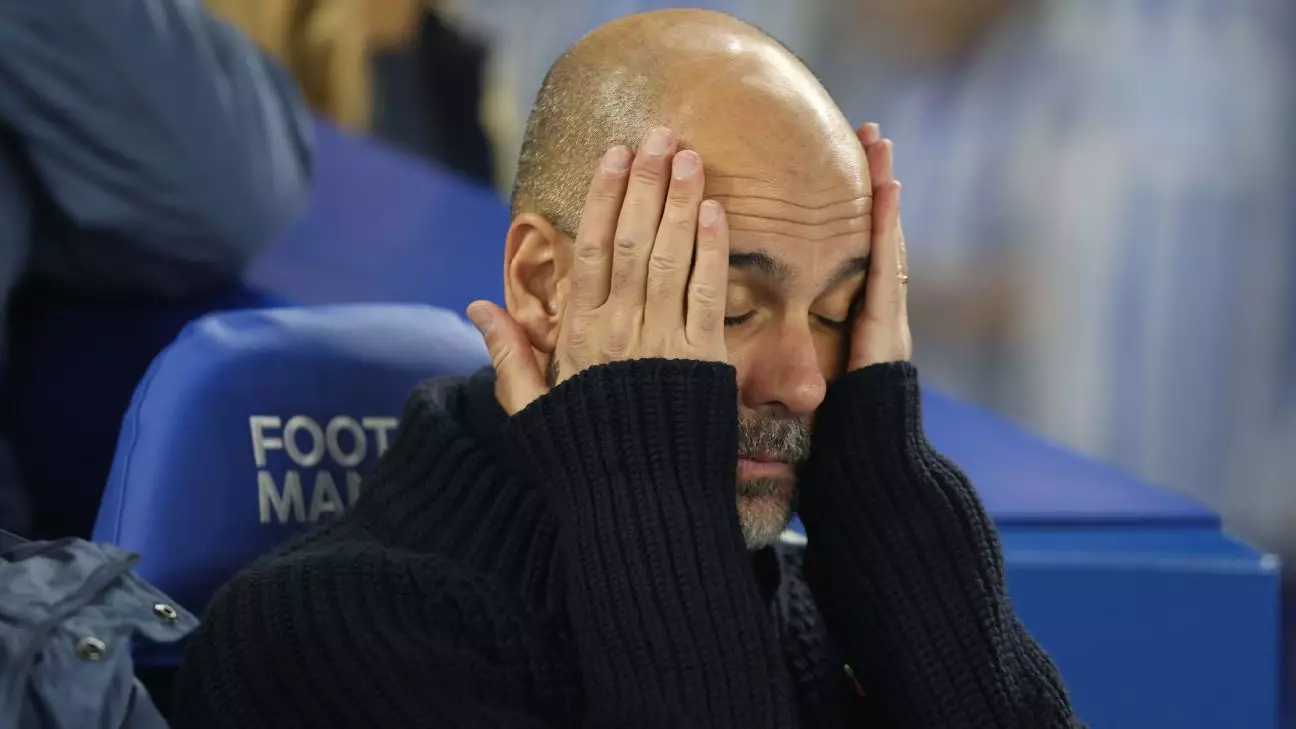In the world of football, terms like “crisis” often carry a weight that can shift perceptions and fortunes in an instant. Pep Guardiola, a titan of modern management with a track record of transforming teams, is now grappling with this unfamiliar sensation at Manchester City. After a devastating 2-1 loss to Brighton, the ramifications of consecutive defeats have transformed into a worrying trend. For the first time since taking charge of his first team at Barcelona, Guardiola faces his fourth straight defeat — a stark signal that even the most successful managers are not immune to the cyclical nature of professional sports.
A Streak of Setbacks
Analyzing the timeline leading to this moment reveals an unsettling pattern for City. The club has recently endured a four-match losing streak across various competitions, a scenario last witnessed back in 2006 — before the massive investment by Sheikh Mansour facilitated the transformation of the club. Losses to Tottenham, Bournemouth, Sporting CP, and now Brighton underline a significant decline, suggesting it may be time to consider the deeper implications of these defeats. This surge of setbacks has raised questions about the team’s resilience and long-term trajectory.
While it may be presumptuous to declare the end of an era, the signs are certainly hard to dismiss. Acknowledging the heavy expectations placed on City, Guardiola himself acknowledged these concerns in a recent press conference. “I know people want that,” he noted, reflecting the palpable anxiety surrounding his future at the club. His awareness of the inevitability of decline is a testament to both his leadership philosophy and the harsh realities faced by even the most decorated professionals.
The context of City’s struggles extends beyond the pitch, manifesting in serious off-field distractions. The Premier League’s 115 charges against the club for financial irregularities loom large, casting doubt over its ability to attract top talent. Players are understandably hesitant to join a club facing significant and potentially transformative penalties, effectively stifling recruitment strategies that are crucial during a downturn. This shadow over the club’s operational integrity complicates Guardiola’s efforts to sculpt a winning team amidst turmoil.
Moreover, the announced departure of Txiki Begiristain, Manchester City’s director of football, compounds the anxiety surrounding the club. Having collaborated closely with Guardiola for years, his exit raises pressing questions regarding Guardiola’s prospects moving forward. With a new director set to take over and a potential overhaul on the horizon, uncertainty appears to be infiltrating the core of City’s management structure.
Injuries and Squad Depth: A Depleted Arsenal
The challenges mount further with critical injuries impacting key players such as Rodri, Kevin De Bruyne, and John Stones. Rodri’s season-ending cruciate ligament injury has been particularly devastating. Historically, the team’s performance with him on the field significantly outperforms when he is absent. Though City managed a series of results without him, the absence of other pivotal figures has exposed a lack of depth that could haunt them throughout the season.
Adding to this is the unexpected departure of Julián Álvarez and the insufficient reinforcements over the summer, which has left the squad in a precarious position. In contrast to their rivals, City’s failure to adequately bolster their numbers may be a catalyst for their recent misfortunes, raising the specter of future difficulties as established stars like De Bruyne and Ederson approach the twilight of their careers.
Although the situation seems dire, it is crucial to remember that Manchester City is not without its strengths. With a mere five points separating them from league leaders Liverpool and a crucial upcoming match at Anfield, they retain the capability for a resurgence. Guardiola insists that a healthy squad will restore the team’s competitive edge, yet the question remains: can he inspire the necessary belief not only in his players but also in the skeptics waiting for signs of irreversible decline?
As the team navigates this challenging chapter, the resolve displayed in the coming weeks will be vital. Guardiola’s legacy is built on overcoming adversity and adapting, traits that may soon be indispensable as the pressures mount from all fronts. The road to recovery will not only require tactical finesse but also mental fortitude — characteristics that, historically, have defined the success of Guardiola and his teams.
The current turmoil at Manchester City marks a significant phase in Guardiola’s illustrious career. While crises may signal the dawn of decline, they can just as easily birth the resurgence necessary to reclaim past glories. Whether this represents a transitional moment for City or the early whispers of a more profound change remains to be seen, but it is clear that the ensuing weeks will be critical. One must wonder if Guardiola’s genius can untangle the threads of pressure he now finds himself bound by, transforming obstacles into opportunities where hope can once again thrive within this football behemoth.

